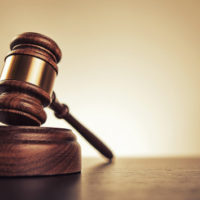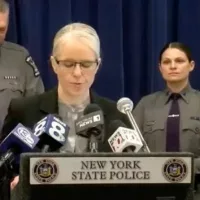
(BALTIMORE) — Prosecutors have dropped charges against Adnan Syed, the man who was convicted of killing his girlfriend in 2000, a case made popular by the 2014 “Serial” podcast that investigated issues with the prosecution.
A spokesperson for the Baltimore City State’s Attorney’s Office confirmed to ABC News that prosecutors are dropping the case against Syed.
A lawyer representing Syed also confirmed to ABC News that charges against Syed were dropped.
Syed, who is now 41, had been serving a life sentence for the past 23 years — more than half his life — since his arrest in 1999.
He was just 17 when he was convicted of first-degree murder, robbery, kidnapping and imprisonment of his ex-girlfriend, Hae Min Lee, in 2000.
On Jan. 13, 1999, 18-year-old Lee vanished after leaving Woodlawn High School in Baltimore, Maryland, where she was a senior.
Her body was found around one month later buried in a park in Baltimore. She had been strangled.
Syed has maintained his innocence and denied any involvement in Lee’s death.
Judge Michelle Phinn ordered Syed’s release last month.
“At this time, we will remove the shackles from Mr. Syed,” Phinn declared after announcing her decision from the bench.
She said then that “in the interests of fairness and justice,” Syed should be released on his own recognizance after finding that prosecutors failed to turn over evidence that could have helped his trial in 2000 and after new evidence was discovered that could have affected the outcome of his case.
The Baltimore State’s Attorney’s Office had 30 days to decide whether to either schedule a new trial date or drop the case.
Lee’s family had appealed Syed’s overturned conviction, saying Baltimore City State’s Attorney Marilyn Mosby’s office neglected to provide them adequate notice to attend the hearing. The family asked the Maryland Court of Special Appeals to pause the proceeding while the court considered their appeal.
Last week, Maryland Attorney General Brian Frosh joined Lee’s family in asking the state’s appellate court to put a hold on Syed’s case in the trial court.
It is unclear what these new developments mean for the family’s appeal.
“Finally, Adnan Syed is able to live as a free man. The DNA results confirmed what we have already known and what underlies all of the current proceedings: that Adnan is innocent and lost 23 years of his life serving time for a crime he did not commit,” Syed’s attorney, assistant public defender and director of the Innocence Project Clinic at University of Baltimore Law School Erica Suter, said in a statement.
With regard to the appeal, Suter said, “While the proceedings are not completely over, this is an important step for Adnan, who has been on house arrest since the motion to vacate was first granted last month. He still needs some time to process everything that has happened and we ask that you provide him and his family with that space.”
In a motion filed in Baltimore City Circuit Court last month, prosecutors said that a nearly yearlong investigation conducted in collaboration with Syed’s defense attorney had uncovered information pointing to the possible involvement of two “alternative suspects” as well as key evidence that didn’t come up at the original trial.
Prosecutors have not named the new suspects.
Their motion detailed how one of the two suspects at one point threatened to kill Lee and both had documented records of violence toward women.
One of the suspects was reportedly convicted of a series of rapes, according to the court documents, while one was convicted of attacking a woman.
“After a nearly year-long investigation reviewing the facts of this case, Syed deserves a new trial where he is adequately represented and the latest evidence can be presented,” Mosby said last month in a statement.
“We believe that keeping Mr. Syed detained as we continue to investigate the case with everything that we know now, when we do not have confidence in results of the first trial, would be unjust,” Mosby said.
At his original trial, prosecutors relied on testimony from a friend, Jay Wilds, who said he helped Syed dig a hole for Lee’s body.
Prosecutors presented cell phone records and expert witness testimony to place Syed at the site where Lee was buried.
At a post-conviction hearing in 2016, a forensics expert testified that those cellphone records were unreliable and should not have been used to convict Syed.
A 2019 appeal for a new trial was previously turned down by the U.S. Supreme Court.
Copyright © 2022, ABC Audio. All rights reserved.















